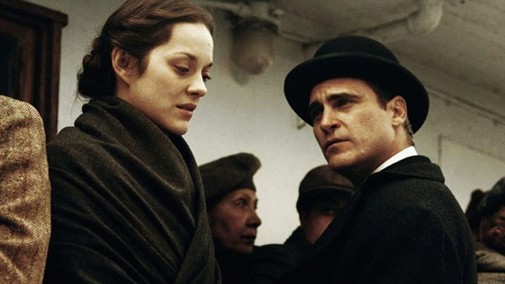New films by James Gray and Jerzy Skolimowski have hit the Croisette, leading to many a Belfast mention and plenty of donkey talk. Armageddon Time, a memoirist exercise that purports to evoke Gray's childhood, has been met with mixed reactions, including here at The Film Experience. However, the consensus leans towards warmth, and, as a longtime James Gray devotee, I couldn't be more excited. After all, nearly every film the man directed faced some negative critiques, yet I love most of them regardless. Unfortunately, the same can't be said about Jerzy Skolimowski. His filmography has been a dependable source of disappointments. By reading some reviews (including Elisa's), his new project, EO, sounds like the cynical bastard child of War Horse and Au Hasard Balthasar. That being said, I doubt the Bressonian comparison will do EO any favors.
For Cannes at Home, today's topics are the film that should have won James Gray the Palme d'Or and Jerzy Skolimowski's Deep End…

THE IMMIGRANT (2013)
In a just world, The Immigrant is the movie that secures Marion Cotillard's Best Actress Oscar nomination for 2014. Though the script includes its fair share of Polish dialogue, Ewa Cybulska might very well be the French star's best English-language performance. It's indubitably the greatest proof that she would have been a silent movie sensation had she been born a century earlier. Those expressive eyes have never been more reminiscent of Renée Falconetti, her porcelain face like that of a gallic Gish sister ready to perform suffering for the camera's pleasure. And yet, there's more to Ewa than immutable martyrdom.
Shot in fifty shades of amber, morning gray and dark shadow, Cotillard portrays how the immigrant's naiveté is squashed by harsh reality, her soul barred in a gesture that's somewhere between self-pity and steely defiance. Joaquin Phoenix, Gray's favorite actor, also appears as the amoral Bruno, the picture's second lead and its most unlikely source of moral revelation. I'm less enchanted by Jeremy Renner's master of prestidigitation, but he succeeds as the kind of archetypical force that The Immigrant uses as its foundation. Indeed, the film is so indebted to those storytelling mechanisms that it often comes off as if it was a time-traveler coming into the present, a temporal migrant seeking shelter.
Its stylistic idioms are rooted in classicism, though they never feel like pastiche. Fittingly, Darius Khondji's cinematography tips its hat at the early 20th-century cinema and New Hollywood's interpretation of the same, combining the two with a flair of modernism. As primordial as its beats might feel, there's nuance in the characterizations, a keen eye towards how composition can illuminate psychology, and how the frayed shroud of beauty only accentuates the ugliness beneath. Like a scaled-down opera staged in the cold halls of Ellis Island and lit by lace-covered oil lamps, The Immigrant sings a familiar song. Yet, it does so with such elegance that one can't avoid being knocked down by the picture's magnificence.
The Immigrant's streaming on Amazon Prime. You can also rent it on several services.

DEEP END (1970)
Jerzy Skolimowski's second English feature is akin to a mourning portrait of the Swinging Sixties. As a new decade starts, the previous one lies rotting, a bloated corpse ready for autopsies and eulogies, revisionistic criticism and nostalgia-infused dreams. Deep End refuses to be pegged as just one of those possibilities, though it's undoubtedly uninterested in moral lessons. Instead, time and place are refracted through the prism of teenage sexuality, a coming-of-age tale that purposefully goes nowhere, remaining a stagnant reflection of loss – maybe innocence lost, perhaps grief, maybe something more challenging to pinpoint.
We follow Mike, a 15-year-old boy who finds a job in the local public bath and quickly becomes besotted by one of his colleagues, the beautiful Susan. A storm of hormones clashing like neutrons during nuclear fission, the boy is hopelessly out of his depth. But, on the other hand, she appears preternaturally sure of herself, a coquettish tease materialized and forever out of reach. Their pas-de-deux is the stuff of teen sex comedy, but Skolimowski has more on his mind than mere titillation. While Deep End has plenty of humor and flesh on display, its greatest triumph lies in how it showcases the multifaceted nature of carnality.
In the damp confines of the baths, Mike faces fantasies made flesh and unwanted advances, risky propositions, and many a temptation, a veritable cornucopia of commonplace sin grown out of newfound sexual freedom. There are laughs and tragedy, too, tones that shouldn't be close, forcedly sutured together. Everything's an awful mess, with even reality losing its constancy. It's easy to see why this is David Lynch's favorite color film, for a connoisseur of fucked-up cinema is bound to find something to love in Deep End. Moreover, the flick's bloody gorgeous, full of saturated colors and palimpsests of degradation on every available wall.
You can find Deep End on Plex and FlixFling.